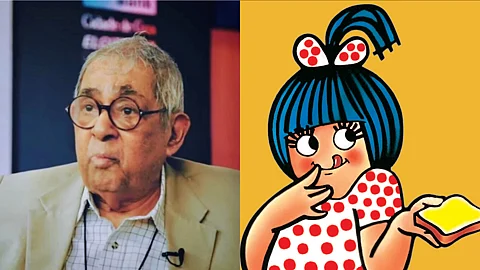
- HOMEGROWN WORLD
- #HGCREATORS
- #HGEXPLORE
- #HGVOICES
- #HGSHOP
- CAREERS
- ABOUT US
- CONTACT US

Ever since the internet became our whole lives, and our attention turned into a currency on social media apps, we have started resenting ads, desperately looking for the skip button every time it pops up. But before this pervasive algorthim based regime took over, there was a time when ads were special, fun and even iconic. One of these iconic ads involved the Amul Girl in a polka-dotted dress and a jingle that still echoes across the cultural canon of India. This week, the visionary behind this ad campaign, Sylvester daCunha, passed away. What's left behind is his legacy; a marvel in communication that is inseparable from our collective nostalgia.
Back in 1966, Sylvester daCunha, along with his wife Nisha, revolutionized advertising with the creation of the 'Utterly Butterly' movement for Amul. At the time, daCunha was working as the manager at Advertising and Sales Promotion Company when he had a brilliant idea - to introduce a mascot that would resonate with mothers and children alike. The original tagline for Amul butter, 'Purely the Best,' needed a catchy replacement, and it was Nisha daCunha who coined the phrase 'Utterly Amul.' Sylvester daCunha added the word 'Butterly' to complete the tagline that would forever be etched in our hearts - 'Utterly Butterly Amul.'
In the early years of the campaign, the advertisements primarily focused on highlighting the product itself. However, in 1967, Sylvester, recognized the need for a shift towards broader societal references. He believed that solely talking about butter wouldn't sustain the campaign's appeal in the long run. This sparked the idea of incorporating social commentary into the advertisements, with sketches that touched a range of subjects from entertainment to sports to politics.
Sylvester daCunha's astute observation of social issues and trends allowed him to seamlessly integrate them into Amul's advertisements, capturing the collective sentiment of the nation. In March 1966, he introduced the first topical ad, capitalizing on the emerging trend of horse racing. The ad featured the Amul girl riding a horse, cleverly replacing the term 'thoroughbred' with 'bread' to establish a witty connection to their butter product.
During the onset of the Hare Rama Hare Krishna movement in 1969, Sylvester daCunha, Mohammad Khan, and Usha Bandarkar, the creative team responsible for Amul's advertising, devised the slogan 'Hurry Amul, Hurry Hurry' alluding to the chant, 'hare rama hare hare'. This ad also established Amul girl's role as a "social observer".
Amidst the period of the Emergency, spanning from 1975 to 1977, the government introduced a policy of enforced sterilization. Sylvester seized the opportunity to respond to the political climate with a satirical tagline, 'We have always practiced compulsory sterilization.' reflecting the absurdity of the situation but also demonstrating Amul's ability to engage in politics with their characteristic blend of humor and social awareness.
In 1982, distressing reports emerged concerning the alleged imposition of virginity tests on Indian women arriving at London's airports by UK authorities. In response to this, Sylvester crafted a poignant retort that read, 'Indian virgin needs no urgin.' This clever play on words not only challenged the discriminatory practice but also celebrated the resilience and dignity of Indian women.
Over the years, the Amul girl has graced countless billboards and print advertisements, capturing the zeitgeist of Indian society with her witty one-liners and timely commentary on current affairs. She became a cultural icon, a beloved figure whose presence brought a smile to our faces. Whether she was commenting on social issues, celebrating festivals, or honouring (sometimes mocking) notable personalities, the Amul girl always had something clever to say; enscapsulating the pulse of the nation. This series of comics, that initially was released every month or every two months, has currently evolved to exploring new topics every single day and is led by Sylvester's son Rahul daCunha.
Sylvester daCunha's exceptional career showcased his astute grasp of political intricacies and social matters, which he artfully integrated into Amul's advertising campaigns. By seamlessly weaving the political and social landscape of the country into Amul's advertisements, daCunha played a pivotal role in establishing the brand's enduring relevance and widespread appeal. He also possessed a keen understanding of the significance of moment marketing, an insight that predated its mainstream recognition within the industry. One could argue that Sylvester through his topical ads created memes before meme culture existed. His invaluable contributions to Amul's advertising legacy are undeniable, as his early realization of the power of humor, wit, and relatability laid the groundwork for the brand's ongoing triumphs in the digital era.
